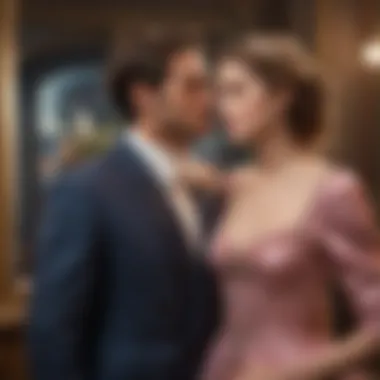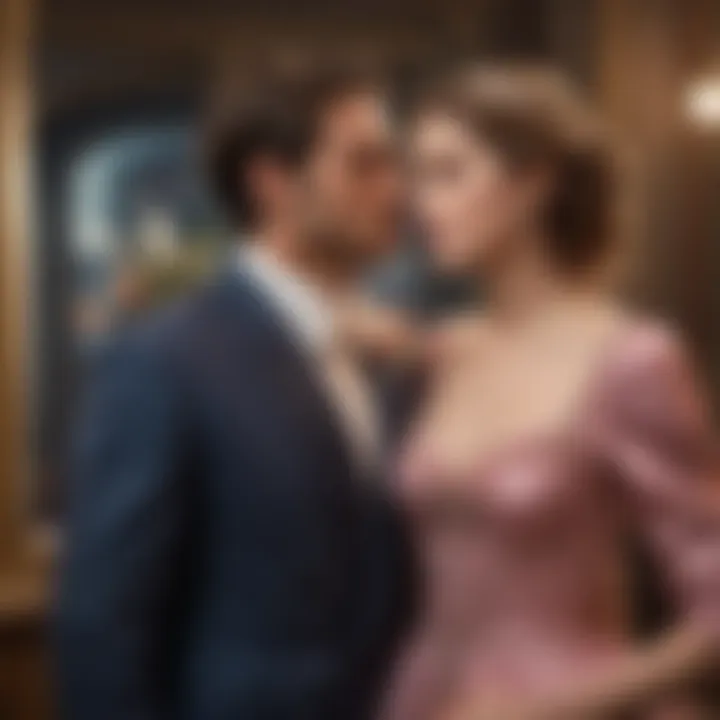The Evolution and Impact of Romantic Comedy Films


Intro
Romantic comedy movies have carved a distinct niche in the cinematic realm, charming audiences with a mix of laughter and love. They serve as more than just entertainment; they reflect societal values, relationship dynamics, and cultural shifts through the ages. The genre plays a pivotal role in shaping our understanding of romance while simultaneously providing a much-needed dose of humor.
By tracing the evolution of romantic comedies, we can see how they’ve encapsulated different eras' sentiments and societal issues. From the whimsical antics of classic films to the more contemporary formulations that blend in diverse narratives, the genre has continuously adapted and thrived.
In this article, we’ll take a closer look at key films and themes that have defined romantic comedies, the common tropes that audiences have come to expect, and the ways in which these films resonate with viewers today. Through this exploration, you’ll gain insight into the genre's charm and relevance, as well as its ability to address complex emotions under a comedic veil.
Prelude to Romantic Comedy
Romantic comedies hold a special place in the heart of cinema, capturing the intricacies of love and laughter in ways that resonate across generations. The genre masterfully intertwines humor with romance, offering audiences a delightful escape from the mundanities of everyday life. For many, these films represent cherished memories - perhaps the first time they watched When Harry Met Sally with friends or had a late-night binge of Bridget Jones's Diary. The significance of romantic comedies lies not only in their entertainment value but also in their ability to reflect societal norms and personal ideals about love.
This article aims to dissect the essence of romantic comedies. We will delve into the roots of the genre, its cultural footprint, and the key elements that define it, cultivating a deeper appreciation for these films. Understanding romantic comedies can also reveal insights about relationships and human connection, which are universal themes that many can relate to.
Definition and Scope
At its core, a romantic comedy is a film genre that blends romance and humor, usually culminating in a happy or optimistic ending. It often features relatable characters navigating the tribulations and joys of love. The scope of romantic comedies is broad, encompassing a variety of storytelling techniques, settings, and character arcs. These films can vary from light-hearted romps filled with quirky meet-cutes to more profound explorations of love's challenges, such as in Crazy, Stupid, Love.
Essentially, romantic comedies offer an escapism that resonates well. They provide not just laughs but also a reflection of romantic ideals. By exploring the exciting and sometimes tumultuous journey towards love, they capture both the trivialities and the profound moments that define relationships.
Cultural Significance
Romantic comedies are not just entertaining films; they also hold a mirror to society and the emotional landscape of relationships. Over the decades, these films have shaped and echoed cultural shifts in dating, gender roles, and the very nature of love itself. For instance, movies like Bridget Jones's Diary not only tell a personal story but also address issues such as body image and singlehood, topics that resonate with many.
Moreover, romantic comedies often showcase diverse aspects of love—from traditional courtship to contemporary challenges. They provide a canvas where audiences can see themselves reflected, perhaps feeling validated in their experiences of love and relationships. When laughter meets love, it gives way to shared experiences that transcend cultural barriers, making romantic comedies a genre that appeals to a wide audience.
"Romantic comedies remind us that love is complex but relatable. They often help us wade through our own romantic trials and tribulations, making us laugh along the way."
Historical Overview of Romantic Comedies
When you dig into the world of romantic comedies, you can't help but notice how the genre has evolved over the years. It's not just about brief laughs and sweet endings; it's a mirror reflecting societal changes and the intricate dynamics of love. This overview will transport you through time, showcasing the roots, evolution, and modern twists in romantic comedies, illustrating their relevance and impact on audiences today.
Early 20th Century Beginnings
The seeds of romantic comedy can be traced back to the silent film era, where physical humor and exaggerated expressions crossed language barriers. Films like It Happened One Night (1934) paved the way for what we now know as the genre. It combined elements of romance and comedy, creating a playful narrative. The early comedic shorts by Charlie Chaplin or Buster Keaton often carried themes of unrequited love or romantic pursuits that made audiences chuckle while tugging at their heartstrings. As these flicks gave way to talkies, witty dialogues and sparkling banter between couples began to blossom.
Golden Age of Hollywood
This era represents a golden moment for romantic comedies. The 1930s to the 1950s introduced unforgettable stars like Katharine Hepburn and Cary Grant. Films such as His Girl Friday (1940) and The Philadelphia Story (1940) gifted us a new style of comedy. They showcased strong, clever women who often outsmarted their male counterparts, challenging gender norms of the time.
- Popular Themes:
- Mistaken identities
- Love triangles
- Clever dialogue that sharpens comedic tension
The genre thrived on screwball comedy, intertwining romance with chaos, creating a delightful spectacle. It’s during this time that many classic tropes were established. The well-known "meet-cute" became a staple — a charming encounter that often leads to comedic misunderstandings. These films infiltrated cultural consciousness, laying a groundwork that continues to influence filmmakers.
Modern Developments
Fast forward to the late 20th and into the 21st century, romantic comedies began to shift. They reflected broader societal norms and attitudes, with a diverse array of stories. The rise of Bridget Jones's Diary (2001) sparked conversation around body positivity and singlehood, appealing to a generation grappling with self-image and expectations.
Recent examples include Crazy, Stupid, Love (2011) and To All the Boys I've Loved Before (2018), which delve deeper into relationship complexities amongst diverse casts. The narratives are no longer just about finding love but also about defining it, acceptance, and friendship.
The genre is ever-evolving, pulsating with the heartbeat of contemporary society. As relationships grow and shift, so will the romantic comedy films, ensuring that audiences remain emotionally engaged through laughter and relatability.
Iconic Romantic Comedy Films
Romantic comedies have a unique charm, often providing both heartwarming stories and humor that resonates with audiences. These films exemplify the genre's ability to intertwine comedy and romance, creating a space where love stories unfold in relatable yet often improbable circumstances. When we talk about iconic romantic comedies, we refer to those films that not only define the genre but have also left an indelible mark on viewers' hearts and minds. They often tackle universal themes—love, heartbreak, friendship—that echo through generations and cultural boundaries.
These films also serve as lenses through which we can examine societal norms and expectations regarding love and relationships. They challenge us, enchant us, and sometimes even teach us lessons about vulnerability and connection. Let’s take a closer look at a few standout films that have shaped this beloved genre.
Untamed Heart
Untamed Heart is a poignant tale that combines elements of romance with a touch of melancholy. The film stars Christian Slater as Adam, a young man with a hidden past and a heart condition, and Marisa Tomei as Caroline, a waitress struggling to find love in a tumultuous world. Their love story unfolds against the backdrop of a gritty Minneapolis, where Adam’s childlike innocence and purity contrast sharply with the harsh realities of life.
The film’s powerful narrative compels viewers to delve deeper into the complexity of love. It challenges the archetype of the perfect couple by highlighting imperfections. Adam's heart condition serves as a metaphor for vulnerability, showcasing how love can often be intertwined with pain and sacrifice. This connection leaves a lasting impression on viewers, enriching the landscape of romantic comedies with emotional depth.


When Harry Met Sally
When Harry Met Sally stands as a quintessential romantic comedy, exploring the question: can men and women be just friends without complicating emotions? Billy Crystal and Meg Ryan deliver unforgettable performances, sparking a chemistry that feels as real as it gets. The dialogues, particularly the famous scene in Katz's Delicatessen, perfectly encapsulate the humor and tension of platonic relationships evolving into romance.
This film elegantly blends humor with insightful commentary on relationships. It addresses the complexities of friendship and desire, refreshing the genre with clever writing and relatable characters. Audience members often find themselves reflecting on their own relationships—how they started, evolved, and sometimes faltered. Overall, the film highlights the unpredictable paths love can take, reinforcing its place in the canon of romantic comedies.
Bridget Jones's Diary
Embodying a mix of self-deprecating humor and romantic escapades, Bridget Jones's Diary centers on the life of Bridget, played by Renée Zellweger. Struggling with issues of weight, self-esteem, and career ambition, she captures the everyday woman's insecurities. The film’s narrative follows Bridget's chaotic love life, as she navigates her feelings for the charming yet infuriating Daniel Cleaver, portrayed by Hugh Grant, and the steady, reliable Mark Darcy, played by Colin Firth.
What makes this film iconic is its refreshing honesty and relatability. It resonates particularly well with women, who often see their own experiences mirrored in Bridget’s hilarious misadventures. The character's growth throughout the film drives home essential lessons about self-acceptance and love, paving the way for discussions around societal expectations of women in romantic contexts.
Crazy, Stupid, Love
Crazy, Stupid, Love is a gem that features an ensemble cast including Steve Carell, Julianne Moore, Ryan Gosling, and Emma Stone. This film deftly intertwines multiple storylines, showcasing the complexities of love across different ages and circumstances. Steve Carell plays Cal, a man blindsided by his wife’s request for a divorce, and his journey towards rediscovery is both humorous and uplifting.
The charm of Crazy, Stupid, Love lies in how it showcases the often chaotic and unpredictable nature of love. With moments of genuine tenderness juxtaposed against sharp wit, it manages to entertain while prompting viewers to reflect on their relationships. The film's exploration of love’s various forms—be it romantic, parental, or friendly—creates a rich tapestry that encourages the audience to contemplate their definitions of love.
These iconic romantic comedies not only provide entertainment but also foster deeper conversations around relationships and personal growth. They are a testament to how films can capture the essence of human connection, making them enduring favorites in the landscape of romantic comedy.
Key Elements of Romantic Comedy
Romantic comedies weave a rich tapestry of narratives, wherein humor dances hand-in-hand with the intricacies of love. These films aren't just about chuckles and heartwarming moments; they hinge delicately on several key elements that shape the genre. Understanding these foundational components is crucial as they not only enhance the comedic experience but also provide depth to romantic pursuits.
Character Archetypes
Character archetypes in romantic comedies are often vivid and relatable. They're the folks we see in our daily lives, yet they carry a larger-than-life quality that makes them particularly engaging. Key figures typically include the charming protagonist caught in the throes of love, the quirky best friend who provides comic relief, and the antagonist who adds obstacles to the romance.
For instance, you have the "girl next door" archetype who is often depicted as genuine and slightly naive, contrasting with the "bad boy" persona who brings excitement and unpredictability. These dynamics create a tension that compels viewers to root for a successful relationship amid the chaos.
In any romantic comedy, these characters are integral in building suspense and establishing humor. They embody the hopes, dreams, and foibles of being human, allowing the audience to resonate with their journeys. As these archetypes are exaggerated yet familiar, they captivate diverse audiences—especially women—who can see reflections of their own experiences in these roles.
Setting and Atmosphere
Setting is another vital thread in the fabric of romantic comedies. Often, the locale serves as a backdrop that elevates the narrative and enhances the comedy. Consider New York in "When Harry Met Sally" or a quaint English village in "Bridget Jones's Diary." These places are not merely geographic markers; they embody the moods and themes of the film.
Atmosphere in romantic comedies plays a critical role in establishing the emotional weight of scenes. The use of whimsical music, vibrant colors, and playful cinematography contributes significantly to creating a sense of nostalgia and yearning. It's in these settings where meet-cutes often unfold, setting the stage for romance while also delivering comedic punches.
The time of year also impacts the overall feel, with summer flings often contrasting sharply with winter holidays in these films. This contrast can evoke feelings ranging from warmth to playfulness, immersing viewers in the emotional journey.
Conflict and Resolution
At the heart of any romantic comedy lies the conflict, as it's this tension that propels the story forward. Conflicts can vary widely—from misunderstandings and societal barriers to personal insecurities and external pressures. These tensions are crucial as they not only invite laughter but also allow for meaningful growth in characters.
A classic trope seen in many films is the misunderstanding between couples, which inevitably leads to moments packed with humor, heartache, and reconciliation. Such conflicts challenge the characters, forcing them to confront their feelings and desires.
Resolution often takes the form of a climactic confession or a grand romantic gesture—think of how the protagonists often confront their fears and choose to embrace love amidst chaos. This denouement not only resolves the romantic tensions but also highlights personal growth, showcasing the transformational power of love.
"Romantic comedies thrive on the delicate balance between humor and heartfelt moments, where conflicts arise organically, leading characters toward ultimate understanding and connection."
In wrapping up, the key elements of character archetypes, setting and atmosphere, and conflict and resolution are what give romantic comedies their rich texture. These factors work in synergy to deliver a narrative that resonates powerfully with audiences and reflects the complexities of romantic relationships.
Tropes in Romantic Comedy
In the realm of romantic comedies, tropes serve as the scaffolding that supports the narrative structure. These recurring themes or plot devices are not merely predictable formulas to churn out films; rather, they enrich storytelling by providing relatable experiences and emotional hooks for the audience. They reflect common human emotions and interactions, which helps viewers connect deeply with the characters. An exploration of major romantic comedy tropes reveals how they influence both the story arcs and the audience's expectations.
Meet-Cutes
One of the most beloved and essential tropes in romantic comedies is the meet-cute. This charming moment often involves two characters experiencing an unexpected or humorous encounter, often under quirky circumstances. A classic example might involve a spilled coffee landing on the handsome stranger's shirt – instant chemistry, mixed with a dash of chaos. The beauty of the meet-cute lies in its ability to spark a connection right from the get-go, setting the tone for the budding romance.
These scenarios create the initial intrigue between characters, inviting the audience into their world. The awkwardness, humor, and serendipity associated with these first encounters keep viewers captivated, making them root for the couple’s journey. The trope also plays into the fantasy that love can start in the most unexpected places, thus appealing particularly to those with romantic ideals.
The Misunderstanding
Another cornerstone of romantic comedy narratives is the misunderstanding trope. This device often serves as a significant plot point, driving the characters apart before their eventual reconciliation. Situations where characters misinterpret each other's words or actions create tension, confusion, and often comedic moments. Think about the times when a character hears only part of a conversation or jumps to conclusions without the full picture. This trope not only heightens drama but also allows for character growth as they learn to communicate effectively.
The misunderstanding also hinges on relatability; who hasn't faced communication barriers in their own relationships? The emotions tied to confusion, jealousy, or misplaced trust fuel the characters' conflict, making their eventual resolution more rewarding. It can sometimes even invigorate the comedy itself, leading to humorous moments just as the characters strive to clarify their feelings.


The Grand Gesture
Finally, we arrive at the grand gesture, a trope that signifies a turning point or climax in the romantic journey. This trope usually involves one character taking significant action to prove their love or commitment to the other. It can be as extravagant as a public declaration of love or as simple as a heartfelt apology. The grand gesture often serves to symbolize hope, courage, and the triumph of love in the face of adversity.
Such moments resonate with audiences because they embody the lengths to which people will go for love. They remind viewers that love often requires vulnerability, and those heartfelt displays can turn even the most cynical hearts. Whether it's Tom Hanks standing out in the rain hoping to convey his feelings or the heartstring tugging scene in "The Notebook," the grand gesture reflects the core of romantic comedy: the chase and the joy of love.
"In romantic comedies, love doesn't always come easy, but the trials and the triumphs make it all the more precious."
By understanding these tropes, audiences can appreciate the structure behind their favorite romantic comedies, recognizing the layers of emotion and conflict that propel the narratives forward. Trends in these tropes also mirror societal shifts, showcasing changing views on romance, relationships, and identity—making them highly relevant for today's viewers.
Diverse Representations in Romantic Comedies
Romantic comedies have long been a staple in cinema, known for their blend of humor and heart. However, beyond the enjoyable plot twists and laugh-out-loud moments, the importance of diverse representations in these films cannot be overstated. In a world where relationships come in many shapes and sizes, reflecting this diversity on screen is essential not just for authenticity, but also for fostering understanding and acceptance among audiences. Such representations deepen the genre’s relevance, making it resonate with a wider array of viewers.
Representation of Gender
When looking at gender representation in romantic comedies, it is crucial to highlight both the archetypes and the deviations from traditional roles. Historically, many films confined female characters to roles of the love interest, often sidelining their ambitions and complex personalities. However, contemporary films are increasingly challenging these norms by creating multifaceted female leads who have their own ambitions and conflicts outside the realm of a romantic relationship.
Consider films like "Bridget Jones's Diary," where Bridget is not just a character pining for love but also a relatable woman navigating her career and friendships. This evolution opens up space for conversations about women’s independence and the pressures they face in society.
Exploration of Sexuality
The exploration of sexuality in romantic comedies has seen significant shifts over the years, reflecting broader societal attitudes towards love and desire. Films that take risks by addressing diverse sexual orientations provide a much-needed platform for underrepresented voices. For instance, movies such as "Love, Simon" and "The Half of It" voice the experiences of LGBTQ+ characters in ways that feel authentic rather than tokenistic.
Such narratives not only broaden the understanding of romantic love but also highlight the challenges faced by individuals who often navigate their identities in a world that may not fully accept them. As society evolves, so must the narratives in romantic comedies to include stories that resonate with all facets of love and attraction, extending compassion and connection across the spectrum.
Cultural Representation
Cultural representation in romantic comedies is critical as it enriches the storytelling while allowing audiences to see themselves in the characters. Films like "Crazy Rich Asians" demonstrate how cultural nuances and differences can be seamlessly woven into a romantic plot, offering viewers a glimpse into the lives, customs, and humor of different cultures. This not only adds a layer of authenticity but also educates audiences about diverse backgrounds, which is invaluable in today’s multicultural society.
"When romantic comedies begin to reflect different cultures, they do more than entertain; they create an environment of empathy and understanding."
Moreover, audiences are more likely to connect with stories that reflect their own realities. Including a wide range of cultural backgrounds in romantic comedies encourages acceptance and helps to break down stereotypes, shaping a more inclusive narrative landscape. What’s more, as filmmakers continue to draw inspiration from their own cultural heritages, the genre opens up to many innovative and refreshing storylines.
The Role of Comedy in Romantic Films
Romantic comedies occupy a unique space within the film world, effectively marrying the light-heartedness of comedy with the often knotty nature of romantic relationships. This genre serves not only to entertain but also to reflect and navigate the experiences of love, making it relatable to audiences. Comedy is more than just a tool for laughter; it’s a device that drives the narrative forward.
The infusion of humor into romantic films can showcase the highs and lows of relationships in a way that feels comfortable yet candid. Oftentimes, the laughter stemming from a shared experience reveals the deeper emotional truths beneath the surface. Such interplay between comedy and romance serves as a bridge, facilitating conversations and allowing viewers to explore their own romantic journeys in a safe and light-hearted manner.
Humor as a Catalyst
In the world of romantic comedies, humor acts as a catalyst for chemistry between characters. It often sparks connections, igniting the initial attraction or miscommunication that propels the story forward. Think about how so many memorable scenes hinge upon a witty exchange or a well-timed joke, setting the stage for deeper feelings to develop.
- Humor can dissolve tension, allowing characters to express vulnerabilities. For instance, a comical mishap during a date can lead to unexpected intimacy as laughter brings them closer.
- The shared joy of a joke can create a bond that's hard to break. When characters laugh together, it builds a foundation of friendship before romantic feelings blossom.
- Mistakes in comedic situations can drive the plot, leading to misunderstandings that further develop the romantic tension. This layer of complexity adds depth to the storyline, appealing to audiences who enjoy navigating these twists and turns.
Ultimately, humor reflects the chaotic beauty of love itself, while also highlighting how laughter can offer relief amid the bumps along the road to romance.
Balance Between Romance and Comedy
Finding the right balance between romance and comedy is pivotal to the success of a romantic comedy film. Too much focus on one aspect can tip the viewing experience, leaving audiences dissatisfied. A masterfully crafted romantic comedy artfully juggles both elements, ensuring that neither overshadows the other.
- Romantic moments anchor the story, giving the audience emotional stakes. These instances—like a heartfelt confession or a significant first kiss—draw viewers in deeply, making them root for the couple. Without these moments, the film would feel flat and disconnected.
- Conversely, comedic relief is essential; it prevents the story from becoming overly sentimental. A well-placed joke can lighten a heavy moment, providing a breather that allows viewers to absorb the emotional weight.
- Directors and writers often employ comedy to critique societal norms that govern love and relationships. This adds depth to the narrative, making it not just a love story but a commentary on modern romance. This blend results in a richer experience where both laughter and love can coexist, making the film more engaging.
"A great romantic comedy speaks not just to the frolics of romance, but also to the human condition itself. It's a mirror reflecting our own desires, often carrying a punchline that keeps us smiling."
In summary, the role of comedy in romantic films transcends mere laughter; it plays an integral part in shaping narratives, developing characters, and enhancing viewer engagement. As audiences, we may find ourselves captivated not just by the love stories unfolding on screen, but by the laughter that connects us, making us feel understood in our own romantic pursuits.
Critical Reception of Romantic Comedies
The critical reception of romantic comedies holds significant weight in understanding their impact, not just as entertainment, but as reflections of societal ideals and norms surrounding love and humor. Over the years, critics and audiences alike have dissected these films, searching for deeper meanings in seemingly light-hearted narratives. This section delves into how romantic comedies have been received over time, highlighting the nuances of audience engagement and critical evaluation.
Audience Reception Trends
One of the most fascinating aspects of romantic comedies is the trends in audience reception. From the exuberance of packed theaters during the 90s heyday to the more restrained responses of modern viewers, the landscape of how people engage with romantic comedies is ever-changing.
- Nostalgia Plays a Role: Many viewers today look back fondly on the classic films from the 80s and 90s, which often serve as benchmarks. Films like "Pretty Woman" and "Notting Hill" created a template that many still cherish. These movies were often grounded in a more traditional view of romance, which resonates with audiences that yearn for simpler narratives.
- Shift Towards Authenticity: Recent romantic comedies, such as "Always Be My Maybe" and "The Lovebirds", showcase a shift towards more authentic and diverse storytelling. Viewers seem to gravitate towards narratives that reflect contemporary realities, including discussions around identity and modern relationships.
- Response to Social Issues: The audience's reception trends also indicate a growing demand for films that integrate social commentary. Romantic comedies that tackle issues like mental health and societal expectations, such as in "Crazy Rich Asians", often have a more favorable response due to addressing relevant themes while still delivering the genre's trademark humor.


Understanding these trends not only helps filmmakers tailor their storytelling but also underscores how deeply audience expectations and individual experiences influence the success of romantic comedies.
Reviews and Critiques
When it comes to reviews and critiques, romantic comedies often find themselves straddling the line between admiration and disappointment among critics. The genre has been both celebrated and derided, revealing the multifaceted nature of its reception.
- Dichotomous Opinions: Critics may praise the relatability and charm of a film one moment, only to criticize its predictive elements the next. For instance, while "Bridget Jones's Diary" received applause for its witty humor and relatable protagonist, some critical voices highlighted it as a reinforcement of traditional stereotypes.
- Cultural Commentary: Intellectual critiques commonly dissect romantic comedies for what they say about cultural attitudes towards love and relationships. The genre reflects societal values and norms, and thus, some critics position these films within broader social discourses, evaluating their role in shaping or challenging prevailing gender roles.
- Impact of Star Power: Reviews often hinge significantly on the star power of the cast. Movies featuring big names like Julia Roberts or Ryan Reynolds draw initial praise based solely on their ability to attract audiences. Critics may attribute a lack of depth to such films, calling them "star vehicles" that rely heavily on their leading actors’ star appeal rather than solid storytelling.
In summary, the reception of romantic comedies serves as a fascinating lens through which to examine societal values, trends, and expectations. As much as these films entertain, they also provoke thought and discussion about love, relationship dynamics, and evolving cultural norms.
Notable Directors of the Genre
The landscape of romantic comedies is greatly shaped by the vision and creativity of specific directors. Their unique perspectives bring to life stories that resonate with audiences, ensuring that the genre continually evolves while staying true to its roots. Understanding the contributions of these directors provides crucial insight into how romantic comedies have developed over the years. Each director has made distinct contributions that have established signature styles and thematic explorations.
Nora Ephron's Contributions
Nora Ephron is frequently celebrated as a pioneer in the romantic comedy genre. Her films tend to focus on the nuances of relationships, often spotlighting the challenges faced by women. Movies like When Harry Met Sally and Sleepless in Seattle highlight her knack for weaving witty dialogue with heartfelt moments. Ephron's work showcases a keen understanding of human emotions coupled with a directness that makes her stories relatable.
One might observe that Ephron's ability to blend comedy with earnestness opens a doorway for viewers to reflect on their own romantic experiences. Her characters are painted with enough depth that audiences not only see them as fictional but also as reflections of themselves.
"Ephron understood that love stories are not just about the rush of romance but also about the mundane challenges that couples face every day."
Richard Curtis's Influence
Richard Curtis stands as another towering figure in the romantic comedy scene, known for writing and directing films that have become classics. His works like Four Weddings and a Funeral and Notting Hill explore love in its various forms while blending humor seamlessly with genuine emotion. Curtis has a distinctive ability to capture the quirks of love—sometimes unpredictable, often messy, yet deeply rewarding.
Curtis also often brings a British flair to romantic comedies, which sets his works apart. The blend of romance with amusing situations and witty banter can often leave audiences in stitches while also making them think. His signature style emphasizes the beauty in everyday moments and the small, delightful surprises that love can provide.
Greg Berlanti's Modern Touch
In the realm of modern romantic comedies, Greg Berlanti has made noteworthy strides. Known for his ability to tackle contemporary themes, Berlanti's projects often highlight diversity in love stories, which is especially evident in films like Love, Simon. His works resonate with younger audiences, bringing fresh perspectives to age-old themes.
Berlanti’s direction shows a commitment to authenticity. By focusing on characters representing various backgrounds and sexual orientations, he sheds light on different facets of love that go beyond the traditional man-woman dynamic we often see in older films. This inclusiveness reshapes the narrative landscape, making romantic comedies more reflective of today’s society.
His films often emphasize that love can be found in many forms, making it a valuable contribution to the genre as it looks to connect with a broader audience.
In summary, the directors of romantic comedies bring their unique perspectives and storytelling styles to the genre, shaping its evolution and cultural significance.
Future of Romantic Comedies
As audiences evolve and social norms shift, the future of romantic comedies hangs in the balance. This genre has historically interlaced humor with heartfelt stories, but recent years have ushered in a wave of change. The importance of examining the future of romantic comedies lies in understanding how filmmakers can adapt to modern sensibilities while still delivering the charm and warmth that audiences crave. In a fast-paced digital world, staying authentic and relatable is more crucial than ever.
Evolving Narratives
Narrative structures within romantic comedies are experiencing a renaissance of sorts. Gone are the days of predictable plots where boy meets girl, invites girl to dinner, and they live 'happily ever after'. Audiences now expect stories that reflect the complexities of contemporary relationships, including themes such as multi-cultural love, LGBTQ+ representation, and the intricacies of digital dating. These evolving narratives not only cater to a wider audience but also resonate deeper by addressing current societal issues.
- Mixed-gender friendships that pivot into romance have become a fertile ground for exploration.
- The impact of technology, such as dating apps, adds layers of comedic and emotional complexity.
- Characters with diverse backgrounds frame narratives that feel inclusive and resonate with real-life experiences, enriching the genre.
Ultimately, the stories we tell shape perceptions of love and relationships. The expectation is that the genre will continue straddling humor and realism while crafting narratives that touch upon truth.
Emerging Trends in Filmmaking
In the realm of filmmaking, we are not just seeing the narratives evolve but also the techniques and methods of production. Emerging technologies and a shift in audience consumption preferences are reshaping how romantic comedies are made. Here are some notable trends to watch:
- Streaming Platforms: Services like Netflix and Hulu are becoming the go-to for romantic comedies. They often bypass the traditional theater route, allowing access to a broader audience, including international viewers.
- Diversity in Storytelling: More filmmakers are stepping up with stories that highlight voices from underrepresented groups. This trend is not just refreshing but vital in broadening the narrative scope of romantic comedies.
- Blending Genres: There's a growing inclination to merge romantic comedy with other genres—such as sci-fi or thriller—serving up fresh perspectives and unexpected plot twists.
- Interactive Films: With advances in technology, interactive storytelling is becoming popular. For example, viewers might choose a character’s next move, allowing for a more personalized experience.
With the rise of platforms like TikTok, short romantic comedy skits have found their own niche, leading to potential film adaptations or longer series capturing the attention span of a new audience.
The future of romantic comedies seems promising, especially as it adapts in clever and heartfelt ways to meet new expectations. By integrating the elements that resonate with audiences while simultaneously embracing modern narratives, the genre is well-positioned to flourish in the years to come.
Epilogue
As we wrap up our journey through the landscape of romantic comedy films, it's essential to reflect on the enduring appeal these movies hold. The uniqueness of the genre lies in its ability to intertwine humor and romance, capturing the essence of love while making audiences laugh. This duality speaks volumes about human experiences that many can relate to, transcending generational divides.
The Enduring Appeal
Romantic comedies have an undeniable charm. They not only entertain but also resonate with our personal narratives, allowing us to see ourselves in the characters, even if the settings and situations are far fanciful.
- Relatability: Many watch rom-coms because they showcase relatable situations and emotions. We’ve all been there—awkward dates, unrequited love, or the thrill of a first kiss. These films remind us that love can be a rollercoaster, often filled with bumps and unexpected turns.
- Hope and Optimism: The genre inherently leans into optimism. With the promise of a happy ending, viewers leave the theater feeling hopeful, which is a comforting thought in times of uncertainty. This idea aligns perfectly with the sentiment of love conquering all.
- Cultural Reflection: Romantic comedies don't just provide escapism; they often mirror societal trends and changes in LGBTQ+ representation, gender roles, and relationship dynamics. This makes them not only a source of entertainment but also a platform for cultural commentary.
- Comedy's Ability to Heal: Laughter can be a powerful antidote to life's struggles. The humor peppered throughout these stories makes them more approachable, softening the sometimes harsh realities of love and relationships.
"Romantic comedies continue to remind us why we chase love, making us laugh, cry, and above all, believe in the power of connection."
From the heartfelt performances to the cleverly woven plots, romantic comedies have left an imprint on cinematic history. It’s a genre that, while constantly evolving, remains grounded in the traditional appeal of love stories, making it timeless.







